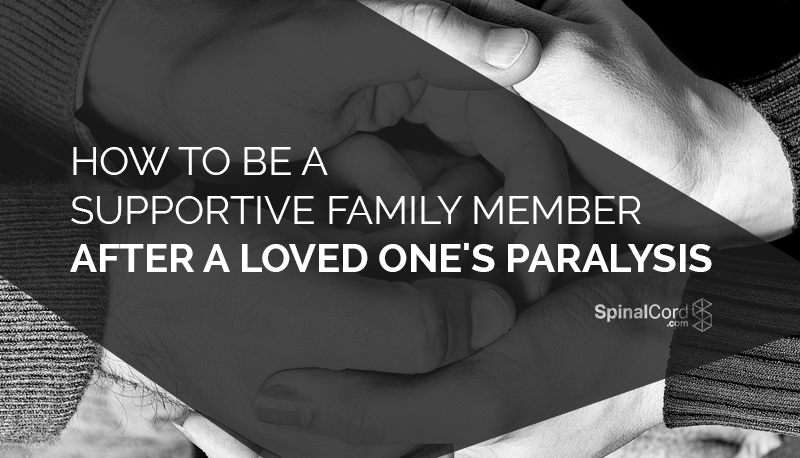How to Be a Supportive Family Member After a Loved One's Paralysis

Knowing how to give the right kind of support to your loved with paralysis can seem intimidating at first. They may be resistant to your assistance even though you are only trying to do what you can to help. How you will contribute isn’t going to be crystal clear right away, but you will learn the best way to approach things with time.
The help that you are offering is valuable, and most people prefer the help of their family member rather than receiving it from strangers. “Family members provide the vast majority of care for people who are chronically ill or disabled.” Committing to this role is bound to become frustrating at times and, though some days will be positive and satisfying, there will also be those that are extremely emotionally and physically draining.
Because of this, it is very important that you do not forget about caring for yourself. Though your family member is in constant need of assistance, you will be of no help to them if you are ill and depressed. Like all things in life, you must find a balance. Though this is a learning process for everyone, there are some things to consider that will help you get started on this path. Below you will find a few examples of what to expect as you move forward and some good practices to have when addressing them.
What To Expect When Caring For a Paralyzed Loved One
Your loved one has a difficult time ahead of them. It is wonderful that they have you to support them, but they may not be able to show their appreciation for you very well at this moment. During this time it will be extremely helpful if you are prepared to address the following things:
Your loved one’s resistance. It is very possible that some of the factors that come with their condition will be unappealing to them, such as not being able to take care of your personal needs and bathing on your own. They may respond to you with anger and refuse to accept your help. Do your best to remain calm and speak to them honestly about how you are only trying to do the best thing for them. Taking a caregiver class is always helpful and can teach you the best type of language to use when communicating with a family member in pain and under stress.
Self-consciousness. Certain situations may cause you to feel self-consciousness for yourself and for your loved one. Share your feelings about this with other supportive friends and family members. Express to them how certain things make you uncomfortable and maybe one of them will take on this task. Another option is to have a home care worker to assist you with certain care that has proved to be too difficult for you. This is very common and does not mean that you are inadequate, this is one of the reasons such personnel exist.
Feelings of frustration and uncontrolled reactions. You are not always going to be at your best and that is okay. There may be times when your loved one’s resistance may be too much for you and staying calm feels impossible. Try not to suppress your feelings. Find someone you can talk to. Pretending that something isn’t upsetting you will only make the issue worse. Remember that your loved one has no control over what is happening and that this is difficult for them as well. There are online support groups that can be extremely helpful if you are unable to leave the house to seek support. You may also consider turning to a social worker, occupational therapist or other health professional. You must know when your loved one’s needs have become too much for you and when it is necessary to ask for help.
Physical limitations. Some assistance that your family member requires may just be too much for you physically. Make sure that you have a physical or occupational therapist teach you how to use your body so that you don't injure yourself in the process. Acknowledging your own limits is a must. You have to set limits for yourself when something could potentially harm you.
Pre-planning for possible mishaps when outside of the home. If you are taking your loved one somewhere away from home you should always bring a small bag or backpack, just in case. Bring some plastic bags with you to put soiled products in and any other items that may be useful to you. Figure out where bathrooms are located on the way to your destination in case you need to make an emergency stop. Bring a sign to hang on the door so other people know you are caring for someone who is disabled and it might take a little while.
Remember To Care For Yourself
“Nearly 3/4s of family caregivers do not go to the doctor as often as they should, and 55% say they skip doctor appointments entirely.” If you are going to support your family member with the kind of care that they require, you must make sure that you are also physically and emotionally healthy. Remind yourself of the things that you have done in the past that have brought you joy and find ways to continue to incorporate them in your life. If you are not the primary caregiver in your family, do what you can to give that person the break that they need and be sure that they are taking adequate care of themselves.
Starting New
Remember that there is so much life left to look forward to for you and your family member with SCI. Once the shock and pain has begun to lessen a bit, you will learn to experience this new way of life. With time, your loved one will be able to do more for themselves and will continue to improve. While this injury has presented you both with new challenges, you must remember that you can make it through together.

Stay Updated on Advancements On Traumatic Brain &
Spinal Cord Injuries
About the Author




